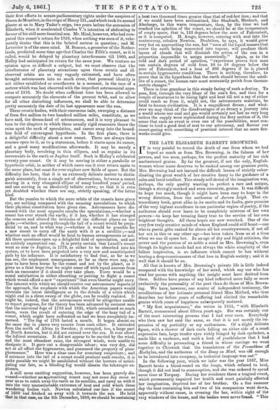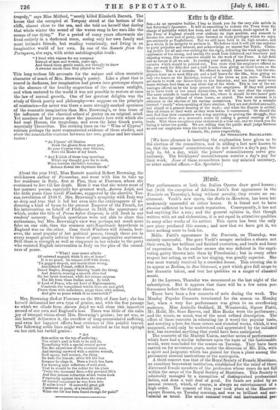THE LATE ELIZABETH BARRETT BROWNING.
IT is very painful to record the death of one from whom we had hoped so much as from Mrs. Browning, in the fulness of her powers, and too soon, perhaps, for the perfect maturity of her rich unchastened genius. By far the greatest, if not the only, English- woman whose name deserves to be ranked among our genuine poets, Mrs. Browning had not learned the difficult lesson of strictly subor- dinating the great wealth of her creative fancy to the guidance of a calm and lucid intellect. This steady self-denial of the imagination was, perhaps, the only quality wanting to perfect a rare and unique, though a straggly-marked and even eccentric, genius. It was difficult 4o hope too much, though it might have been easy to hope in the wrong direction, from the authoress of Aurora Leigh. That ex- traordinary book, great alike in its merits and its faults, gave promise of the very highest excellence in one particular region of poetry, if the authoress should ever learn to be completely mistress of her own powers—to keep her teeming fancy true to the service of her own brightest thoughts. All these hopes are now wrecked. One of the very few truly creative minds of whom England could still boast—one who in poetic gifts ranked far above all her countrywomen, if not all her sex in this or any other age—has been taken from us at a time when we can ill spare her. In an age of dry and frigid criticism, the power and the passion of so noble a mind as Mrs. Browning's, even though its highest moods had not always the white simplicity of the fullest inspiration, is an influence which cannot be lost without leaving a deep consciousness of that loss in English society, and it is well that it should be so.
All that is known of Mrs. Browning's private life is little indeed compared with the knowledge of her mind, which any one who has read her poems with anything like insight must have derived from them. Seldom have poems of any kind reflected more fully or more exclusively the personality of the poet than do those of Mrs. Brown- ing. We have, however, one source of independent testimony, the recollections of her intimate personal friend Miss Mitford, who thus describes her before years of suffering had elicited the remarkable genius which years of happiness subsequently matured.
"My first acquaintance," she writes in 1851, "with Elizabeth Barrett, commenced about fifteen year's ago. She was certainly one of the most interesting persons that I had ever seen. Everybody who then saw her said the same, so that it is not merely the im- pression of my partiality or my enthusiasm. Of a slight delicate figure, with a shower of dark curls falling on either side of a most expressive face, large tender eyes richly fringed by dark eyelashes, a smile like a sunbeam, and Buell a look of youthfulness that I had some difficulty in persuading a friend in whose carriage we went together to Chiswick that the translatress of the Prometheus of ./Eschylus, and the authoress of the Essay on Mind, was chit enough to be introduced into company, in technical language was out." In the following year, which we infer was the year 1837, Miss Barrett broke a blood-vessel on the lungs, which refused to heal, though it did not lead to consumption, and she was ordered to spend some time at Torquay. During her residence there a tragical event, which permanently impaired her health and most painfully affected her imagination, deprived her of her brother. On a fine summer day the boat containing him and two of his companions went down, apparently without cause, in crossing the bar, within sight of the very windows of the house, and the bodies were never found. "This
tragedy," says Miss Milford, "nearly killed Elizabeth Barrett. The I house that she occupied at Torquay stood at the bottom of the cliffs, almost close to the sea, and she told me herself that during that whole winter the sound of the waves rang in her ears like the moans of one dying." For a period of many years afterwards she lived entirely in a darkened room, seeing only her own family and most intimate friends, but reading voraciously, and living in an imaginative world of her own. In one of the Sonnets from the Portuguese, she says, with strict autobiographic truth:
"I lived with visions for my company
Instead of men and women, years ago, And found them gentle mates, nor thought to know A sweeter music than they played to me."
This long recluse life accounts for the unique and often eccentric character of much of Mrs. Browning's poetry. Like a plant that is reared in darkness, her imagination had grown into grotesque shapes in the absence of the healthy magnetism of the common sunlight, and when restored to the world it was not possible to restore at once the law of normal growth. One of her greatest delights was the study of Greek poetry and philosophy—we suppose on the principle of contraries—for never was there a more strongly-marked specimen of the romantic imagination than Mrs. Browning's, or less trace of the influence of the classical school of poetry on an original mind. Yet numbers of her poems show the passionate love with which she had read Homer, the tragedians, and even the later Greek poets, especially Theocritus. The striking lines on the "Wine of Cyprus" contain perhaps the most concentrated evidence of these studies, and show the remarkable contrast between her own genius and her classic tastes :
"As Ulysses' old libation
Drew the ghosts from every part, So your Cyprus wine, dear Grecian, Stirs the Hades of my heart.
"And I think of those long mornings Which my thought goes far to seek, When betwixt the folio's turnings
Solemn flowed the rhythmic Greek."
About the year 1847, Miss Barrett married Robert Browning, the well-known author of Paracelsus, and went with him to take up her residence in Italy, first at Pisa, then at Florence, where she continued to live till her death. Here it was that she wrote most of her maturer poems, especially her greatest work, Aurora Leigh; and the little poem Casa Guidi Windows, suggested by the abortive Tus- can revolution of 1848-9. Mrs. Browning's sympathy with Italy was so deep and true that it led her even into t'he extravagance of ad- dressing a kind of hymn to the present Emperor of the French, for his intervention on behalf of Piedmont in 1859, the appearance of which, under the title of Poems before Congress, is still fresh in our readers' memory. English spectators were not able to share this enthusiasm, but Mrs. Browning's view was perhaps not much more false on one side, than the common anti-Napoleonic hypothesis in England was on the other. Casa Guidi Windows will remain, how- ever, the most popular of her political poems, though these are in every respect greatly inferior to those of pure imaginative sentiment. Still there is strength as well as eloquence in her rebuke to the party who resisted English intervention in Italy on the plea of the sacred- ness of peace.
"What! your peace admits Of outward anguish while it sits at home! It is no peace, 'tis treason stiff with doom; 'Tie gagged despair, and inarticulate wrong, Annihilated Poland, stifled Rome,
Dazed Naples, Hungary fainting 'neath the thong,
And Austria wearing a smooth olive-leaf On her brute forehead, while her troops ontpress . The life from these Italian souls. In brief, 0 Lord of Peace, who art Lard of Righteousness, Constrain the vanquished worlds from sin and grief, Pierce them with conscience, purge them with redress, And give us peace which is no counterfeit:"
Mrs. Browning died at Florence on the 29th of June last; she has herself delineated her own type of genius, and, with the floe passage to which we allude from Aurora Leigh we will close this imperfect record of our own and England's loss. There was little of the calm joy of tranquil vision about Mrs. Browning's genius ; her art was, as she herself delineates it, the overflow of long-accumulated suffering, and even her happiest efforts bear evidence of this painful travail. The following noble lines might well be selected as the best epitaph on her rich but turbid genius :
"Art
Sets action on the top of suffering; The artist's part is both to be and do, Transfixing with a special central power The flat experience of the common man, And turning outward with a sudden wrench, Half agony, half ecstacy, the thing lie feels the inmost: never felt the less Because he sings it. Does a torch less burn For burning next reflectors of cold steel, That he should be the colder for his place 'Twixt two incessant fires,—his personal life's And that intense refraction which burns back Perpetually against him from the round Of crystal conscience he was born into If artist-born? 0 sorrowful great gift Conferred on poets, of a twofold life, When ORB life has been found enough for paint"































 Previous page
Previous page